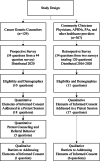Genetic counselors' and community clinicians' implementation and perceived barriers to informed consent during pre-test counseling for hereditary cancer risk
- PMID: 38480478
- PMCID: PMC11393174
- DOI: 10.1002/jgc4.1887
Genetic counselors' and community clinicians' implementation and perceived barriers to informed consent during pre-test counseling for hereditary cancer risk
Abstract
As demand for genetic cancer risk assessment (GCRA) continues to increase, so does the sense of urgency to scale up efforts to triage patients, facilitate informed consent, and order genetic testing for cancer risk. The National Society of Genetic Counselors outlines the elements of informed consent that should be addressed in a GCRA session. While this practice resource aims to improve health equity, research on how well the elements of informed consent are implemented in practice is lacking. This retrospective and prospective mixed-methods study assessed how adequately the elements of informed consent are addressed during pre-test GCRA among 307 community clinicians (CC) and 129 cancer genetic counselors (GC), and barriers they face to addressing these elements. Results revealed that more than 90% of both cohorts consistently addressed components of at least 5 of the 10 elements of informed consent during a pre-test consultation. Technical aspects and accuracy of the test and utilization of test results were the most similarly addressed elements. Notably, GCs more often review the purpose of the test and who to test, general information about the gene(s), and economic considerations whereas CCs more often review alternatives to testing. Both cohorts reported psychosocial aspects of the informed consent process as the least adequately addressed element. Time constraints and patient-related concerns were most often cited by both cohorts as barriers to optimal facilitation of informed consent. Additional barriers reported by CCs included provider lack of awareness, experience, or education, and availability of resources and institutional support. Findings from this study may contribute to the development of alternative delivery models that incorporate supplementary educational tools to enhance patient understanding about the utility of genetic testing, while helping to mitigate the barrier of time constraints. Equally important is the use of this information to develop continuing education tools for providers.
Keywords: education; genetic counseling; genetics services; risk assessment; service delivery models.
© 2024 The Authors. Journal of Genetic Counseling published by Wiley Periodicals LLC on behalf of National Society of Genetic Counselors.
Conflict of interest statement
Authors Alexandra Capasso, Bita Nehoray, Nicholas Gorman, Emily Quinn, Daiana Buccio, and Kathleen Blazer declare that they have no conflict of interest.
Similar articles
-
American Society of Clinical Oncology policy statement update: genetic testing for cancer susceptibility.J Clin Oncol. 2003 Jun 15;21(12):2397-406. doi: 10.1200/JCO.2003.03.189. Epub 2003 Apr 11. J Clin Oncol. 2003. PMID: 12692171
-
Defining critical educational components of informed consent for genetic testing: views of US-based genetic counselors and medical geneticists.Eur J Hum Genet. 2023 Oct;31(10):1165-1174. doi: 10.1038/s41431-023-01401-0. Epub 2023 Jun 12. Eur J Hum Genet. 2023. PMID: 37308598 Free PMC article.
-
'We don't know for sure': discussion of uncertainty concerning multigene panel testing during initial cancer genetic consultations.Fam Cancer. 2020 Jan;19(1):65-76. doi: 10.1007/s10689-019-00154-4. Epub 2019 Nov 26. Fam Cancer. 2020. PMID: 31773425 Free PMC article.
-
Clinical genetic counseling and translation considerations for polygenic scores in personalized risk assessments: A Practice Resource from the National Society of Genetic Counselors.J Genet Couns. 2023 Jun;32(3):558-575. doi: 10.1002/jgc4.1668. Epub 2023 Jan 8. J Genet Couns. 2023. PMID: 36617640 Review.
-
Informed Consent in the Genomics Era.Cold Spring Harb Perspect Med. 2020 Aug 3;10(8):a036582. doi: 10.1101/cshperspect.a036582. Cold Spring Harb Perspect Med. 2020. PMID: 31570382 Free PMC article. Review.
References
-
- Berliner, J. L. , Cummings, S. A. , Boldt Burnett, B. , & Ricker, C. N. (2021). Risk assessment and genetic counseling for hereditary breast and ovarian cancer syndromes‐practice resource of the National Society of Genetic Counselors. Journal of Genetic Counseling, 30(2), 342–360. 10.1002/jgc4.1374 - DOI - PubMed
MeSH terms
Grants and funding
LinkOut - more resources
Full Text Sources
Medical
Research Materials
Miscellaneous


